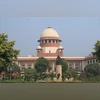The Supreme Court on Friday cautioned the Gujarat authorities, warning that if they are found guilty of contempt for demolishing properties despite a clear court order, they will be required to restore the demolished structures. The court’s warning came during a hearing on an ongoing plea that alleges the Gujarat authorities violated the apex court’s ruling, which had stopped demolitions across the country without its explicit permission.
A bench comprising Justices B R Gavai and K V Viswanathan heard the case, where senior advocate Sanjay Hegde, representing the petitioner Summast Patni Muslim Jamat, argued that despite the court’s previous directive, authorities in Gujarat had gone ahead and demolished properties. The order in question, issued on September 17, had explicitly stated that no demolition of properties, including those linked to accused individuals, should take place without the Supreme Court’s prior approval.
Gujarat authorities claim exemption
Responding to the allegations, Solicitor General Tushar Mehta, appearing for the Gujarat authorities, argued that the demolished structures in question were located around 340 metres from the Somnath Temple, near the sea. He further contended that these structures fell within the exemption outlined in the Supreme Court’s September order, which allowed for the removal of unauthorised constructions in public spaces, such as roads, footpaths, or near water bodies.
The Solicitor General maintained that the demolitions were legally justified, asserting that they complied with the exceptions laid out by the court.
Supreme Court’s warning
The bench, however, expressed its concern over the potential disregard for its order. “If we find that they are in contempt of our order, not only will we send them to jail, but we will ask them to restore all these demolished structures,” the bench remarked, signalling the gravity of the situation.
The court, without issuing a formal notice on the plea, instructed the Solicitor General to file a response and adjourned the hearing until 16 October.
More From This Section
Bulldozer action and SC intervention
The issue of bulldozer action has gained significant attention across India since 2022. According to media reports, more than 150,000 homes have been demolished during this period, with over 738,000 people rendered homeless. In many cases, authorities have used accusations against residents as a pretext to justify the demolitions. Often, notices of encroachment are promptly issued following an unrelated dispute, allowing the authorities to proceed with bulldozing the properties before the accused can defend themselves through the judicial process.
Several High Courts have taken up cases challenging these actions, many of which have involved claims of collusion between the executive authorities and other parties, leading to illegal demolitions.
On September 17, a Supreme Court bench issued an interim order, temporarily halting demolitions across India without the court's permission. This order, however, exempted demolitions targeting illegal encroachments on public roads, railway lines, footpaths, and water bodies. The order also did not apply to demolitions previously sanctioned by a court of law.
On October 1, the Supreme Court extended this interim stay on illegal demolitions, reserving its judgment for a later date while maintaining its prohibition on bulldozer actions unless explicitly approved by the court.
[With agency inputs]

)
